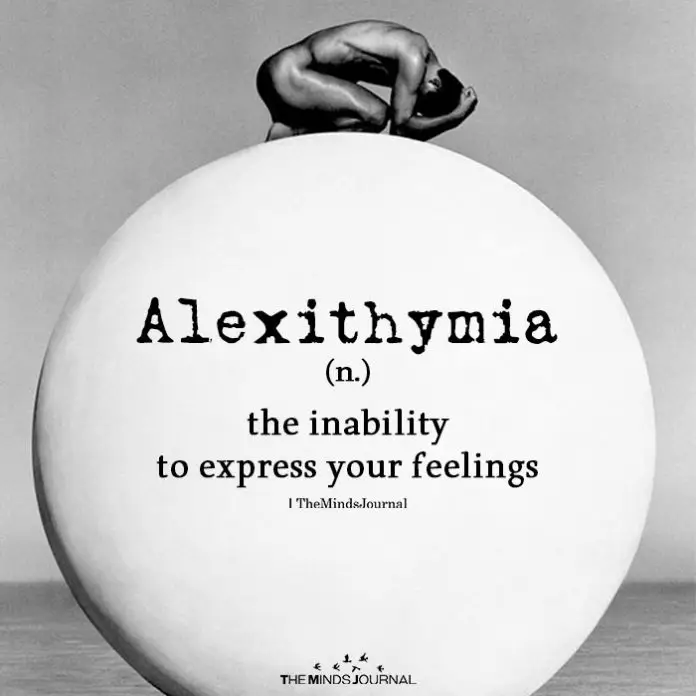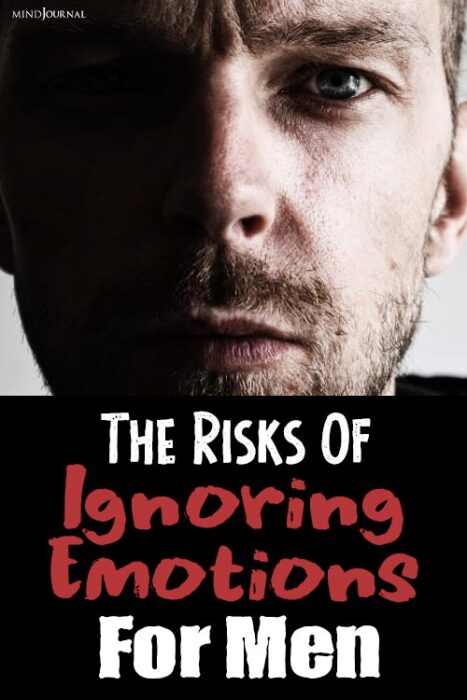Men have always been told that they cannot and should not express their feelings, because they are men. However, suppressing feelings or alexithymia can lead to many complications, such as relationship issues and medical problems.
Key Points
- Alexithymia is defined as “lacking words for emotions,” and it’s more common among men than women.
- Suppressing your feelings can lead to medical problems or relationship difficulties.
- Using certain techniques, it’s possible to improve your ability to understand your own emotions, as well as those of others.
If you’re a man, have you ever been told that you lack empathy? Maybe you’ve even recognized it in yourself: maybe you have trouble sensing how other people feel, or have difficulty picking up on non-verbal cues.
You can get a sense of “happy vs. unhappy” or “good vs. bad,” but that’s as far as it goes. (If you don’t recognize yourself in this description, do you recognize a current or former friend, boyfriend, or husband?)
Such a difficulty might not reflect who you are inside; perhaps your sensitivities run deep, and you really know how other people feel.
But if you can’t express these feelings, and can’t relate to similar sensitivities in others, you may be misinterpreted as arrogant or aloof, and this could cause problems in your most important relationships.
Maybe it might be clearer to see it from the perspective of Imi Lo, a mental health clinician and psychotherapist who wrote in Psychology Today that people like this tend to define themselves with logic, instead of emotion.
They emphasize the importance of being “rational,” as opposed to emotional, and they seem frustrated when other people in their lives have strong feelings to which they can’t relate.
Lo suggests that these traits are often descriptive of a stereotypically “masculine” man: someone who relies on pure logic (or at least, what seems to him like logic) and believes that emotional channels of information are largely a feminine domain.
Related: Do Men Ignore Their Emotions? 10 Ways Men Can Crack the Code of Their Feelings
Understanding Alexithymia
In truth, having difficulty understanding emotion in this way is a fairly common psychological trait called alexithymia.
The word’s origin is Greek, comes from “lacking words for emotions,” and it describes a profound disconnection between conscious thought and the internal, corporeal signals of emotion.
You may have feelings inside you, but you’ll probably have difficulty identifying them clearly, or knowing how to express them.
It’s not a mental disorder per se, but rather, a trait that can pose distinct psychological challenges.
In addition to a limited ability to experience empathy, some other common indicators of alexithymia, according to Kate Balestrieri Psy.D., CST, PACT-III, CSAT-S, include difficulty regulating emotions, fear of intimacy, frequent emotional distancing, an exaggerated interest in autonomy, inhibited emotional expression and discomfort in social settings, along with a “chronic negative mood.”
The concept was first described in 1976 by behavioral scientists Peter Sifneos, John Nemiah, and Harald J. Freyberger at the Harvard Medical School (Nemiah et al., 1976).
Often misinterpreted as a symptom of an autistic spectrum disorder, alexithymia can be isolated and measured by the twenty-question Toronto Alexithymia Scale (as reported by Susan Krauss Whitbourne, Ph.D., on Psychology Today).
The TAS provides an overall alexithymia score and also distinguishes between three subtypes: difficulty describing feelings, difficulty identifying feelings, and externally-oriented thinking (the propensity for solving problems by attacking them directly, rather than by thinking them through in your mind beforehand).
However, recent research conducted by a team of psychologists at the University of Toronto (Carnovale, 2021) has suggested that these three sub-types do not represent a genuine way to break up the category overall and indicates that the alexithymia scale should really only be used as a unitary construct.

Why It’s Important to Experience Emotions
If you’re currently admitting to yourself that you have some difficulty understanding and labeling your own emotions, you’re probably also wondering why in the world it should matter. First off, as Lo noted, confusion within leads to confusion without.
When you’re uncertain about how you feel, the people close to you will have trouble understanding you and knowing what they want from you, and your personal relationships will be equally full of strife.
You’re likely to be able to act out your feelings, such as by venting some chaotic, frightening anger, but not able to avoid a fight by simply telling someone “I am angry with you.”
Alternatively, if you don’t let your emotions spill out into your behavior, you may be suppressing them in ways that affect your body and your health (as Krauss Whitbourne suggests).
Feelings do not vanish when you push them aside, she says: the energy they generate will reside elsewhere in your body and can create problems there. You might experience a mysteriously upset stomach, or have chronic, unexplainable headaches.
Lo indicates that suppressed or poorly expressed emotions can contribute to physiological issues like a racing heartbeat, chronic pain, or difficulty breathing.
Your body, Krauss Whitbourne says, will show you that something is deeply, emotionally wrong, even if you’re not able to identify it and give it a name. There’s also the risk of psychological, rather than physical, pain.
Lo says people with alexithymia are twice as likely to get depressed, even if they don’t know why; their motivation may disappear and their energy, along with the happiness they might find in their leisure activities, may mysteriously drain away. Or, alexithymia may interfere with relationship satisfaction.
“One partner’s desire to co-regulate big feelings with their partner may feel overwhelming or threatening to the partner with alexithymia,” says Balestrieri. At an extreme, this could lead to emotional abandonment, leaving the non-alexithymic partner feeling cut off and alienated (Scigala et al, 2021).
Some people develop alexithymia during childhood; Lo argues that it is caused by a disruption in normal emotional development, which can happen when a child has parents who are not able to understand or talk about their emotions—or, significantly, to model appropriate emotional expression for their children.
Scigala et al. (2021) agree, going on to say that “children who develop alexithymia may have had parents who were ambivalent, rejecting, or emotionally unavailable.”
It’s also possible to be born with alexithymia, a consequence of genetic differences, or to develop it after suffering brain damage (to a part of the brain known as the anterior insula).
Related: Why Men Who Cry Are Not Weak, They Are Stronger Than The Rest
Why Alexithymia is More Common in Men
But, as I suggested earlier, the largest portion of the U.S. population who suffer from alexithymia may have come into it another way. Jayne Leonard, on Medical News Today, states bluntly that “alexithymia occurs more frequently in men than women.”
Lo concurs, noting that the current prevalence of alexithymia among men (17 percent) is quite significantly higher than among women (10 percent).
Balestrieri suggests that it may develop in men as a defense against emotion, involving the suppression of distress.
This, in turn, may be inculcated by families that rigidly adhere to traditional gender role expectations: in such families, sons may be warned against expressing emotions that make them seem vulnerable, while daughters may not be so dissuaded.
Men, according to Dr. Balestrieri, are often only permitted to express their frustration or anger, which seem like more traditionally “powerful” emotions that appear to avoid the perceived risk of admitting vulnerability.
Thus, young men learn to act as though they do not feel emotions, and become less and less comfortable expressing them to others.
Being alienated from one’s own emotions in this way, Balestrieri says, is “not normal” for men but “has become normalized, due to the reinforcing nature of performative masculinity that demands stoicism.”
Aditi Murti, a journalist writing for the health, science, and culture website The Swaddle, agrees, reporting that “for cisgender men, the performative nature of masculinity can be exhausting. While sex is noted at birth, gender is a socialized construct. Many men learn the rules of toxic masculinity—dominance, competition, aggression, and stoicism early in life.”
Simply put, this isn’t healthy for anyone. Human beings have evolved to have emotions for many good reasons, including interpersonal communication, inter-group bonding, and detection of danger;
Overall, it’s not difficult to see that emotions have always been important to our survival. Cultural or intra-familial trends that devalue the experience of, or the expression of, male emotions place an unnecessary and harmful burden on many men.
As Balestrieri puts it, “men deserve to be seen, and their emotions validated.” Rigid, traditionally masculine expectations that prohibit the expression of emotions may cause physical illnesses, or hold men back from finding greater satisfaction in their relationships.
How Can Men Manage Alexithymia?
There are ways to change the manner in which you experience and express your emotions. To whatever degree alexithymia has become part of your experience, it is also possible to reverse it.
Naturally, psychotherapy is an excellent place to develop comfort with identifying and verbalizing your feelings—a safe space, some say, to try to find new ways to be who you are.
A good therapist will be open, genuine, and authentically present; psychotherapy with such a person can help you locate feelings in your body—like the “butterflies in your stomach” you might get when you’re anxious—and can assist you in attributing specific words to these phenomena.
Related: 10 Signs Of Emotional Numbness and Ways To Recover
Lo also recommends mentalization-based treatment, the focus of which is generally on building connections between your feelings and your thoughts.
According to Lo, you might also develop greater emotional awareness by keeping a journal, listening to music, or empathizing with the characters you meet in the movies you watch or the novels you read.
Emotions are multifarious, not one-size-fits-all; after many years of evading or suppressing them, it may take some time to bring them to the surface.
But please rest assured: It can be done, and when you gain greater comfort with feelings of vulnerability, you’ll have taken a significant step toward improving your relationships, your health, and your self-knowledge.
Want to know more about why alexithymia is more common in men compared to women? Check this video out below!
Check out Loren Soeiro’s blog for more such informative, educative, and interesting articles.
References:
Balestrieri, K. (2021, December 9). Why Men May Struggle to Communicate Their Feelings. Retrieved from https://www.psychologytoday.com/us/blog/the-intersection-mental-health-…. Carnovale, M., Taylor, G. J., Parker, J. D. A., Sanches, M., & Bagby, R. M. (2021). A bifactor analysis of the 20-item Toronto Alexithymia Scale: Further support for a general alexithymia factor. Psychological Assessment, 33(7), 619–628. Leonard, J. (2019, September 25). Alexithymia: Symptoms, diagnosis, and links with mental health. Retrieved from https://www.medicalnewstoday.com/articles/326451. Lo, I. (2021, February 6). Alexithymia: Do You Know What You Feel? Retrieved from https://www.psychologytoday.com/us/blog/living-emotional-intensity/2021… Murti, A. (2020, November 21). Stoicism Has Become a Masculine Ideal That Values Repression, Indifference. Retrieved from https://theswaddle.com/stoicism-has-become-a-masculine-ideal-that-value…. Nemiah, J. C., Freyberger, H., & Sifneos, P. E. (1976). Alexithymia: A view of the psychosomatic process. In O. W. Hill (Ed.), Modern trends in psychosomatic medicine (Vol. 3; pp. 430-439). London: Butterworths. Scigala, D. K., Fabris, M. A., Badenes-Ribera, L., Zdankiewicz-Scigala, E., & Longobardi, C. (2021). Alexithymia and Self Differentiation: The Role of Fear of Intimacy and Insecure Adult Attachment. Contemporary Family Therapy, 43(2), 165–176. Whitbourne, S. K. (2021, July 27). Why Exploring Your Feelings Is Good for Your Health. Retrieved from https://www.psychologytoday.com/us/blog/fulfillment-any-age/202107/why-…
Written By Loren Soeiro Originally Appeared On Psychology Today









Leave a Reply
You must be logged in to post a comment.